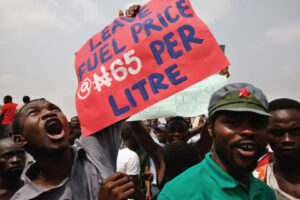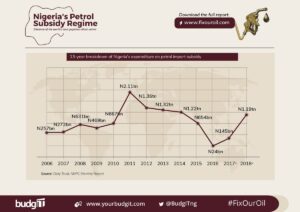
Fuel Subsidy Removal – Our Current Economic Dilemma
The recent Federal Government announcement, through the Minister of Finance, to remove subsidy in 2022 and sell petrol for N345 has received several reactions from the public. Many questioned the integrity of the Federal Government and their lack of sensitivity to the plight of Nigerians. Every administration has always promised to remove subsidies. In fact, in 2010, the present ruling party protested against subsidy removal and gave plethoral reasons for not removing the subsidy.

A subsidy is sometimes inevitable, and other economies around the world do subsidize. The question is not about subsidy but about what is subsidized. The government has always subsidized consumption instead of production. And in a nation where production is almost non-existent, the vast majority of the population would be consumption-driven. Any subsidy removal immediately affects their living condition.
Another concern is the inability of the Federal Government to account for the volume of petrol Nigerians accurately consume daily. This inefficiency opened the subsidy regime to fraud and manipulations at the expense of the public. But should the government pass its inefficiency to its citizens?
There is also a question of trust. Since this administration came to power, the petrol price has steadily increased, and the public news was no more subsidy but an implicit cost. Different terminologies have been used to describe subsidy which lowers the government’s trust level. How are we sure that the 2022 subsidy removal is final? How can Nigerians trust their government?
The hope was that the Dangote refinery and the revamping of the national refineries would boost our economic growth efforts. At whose expense? The government knows that there is no way a private refinery would be profitable without complete deregulation or some form of subsidy. The refinery business is a margin business, and the incentive has to be more than the cost to attract investment.
The government has promised that the petrol would be sold for N345 per liter. Is that also true? The international price of gasoline averages around $1 per liter. Thus PMS is expected to trail naira to a dollar. The implication is that we should be prepared for N420 or N450 per liter of petrol. And if the government pegs it at N345, they would still be paying about N80 to N100 in subsidy. It means that the new price of N345 was not a total subsidy removal rather an adjustment in price for devaluation and inflationary effect.
The consequence is a vicious circle of hardship and misery for the populace. More middle/working class would fall below the poverty line while poor people would fall into despair and depression. Inflation would rise as prices of goods and services increase. The corollary effect is that the N30,000 minimum wage is no longer tenable. The government should expect workers to demand a review of up to N100,000 as minimum wage. Would this be feasible? I doubt.
The idea proposed by the government to pay the 40million Nigerians N5,000 per month does not sound realistic and economical. A rough calculation shows that up to N2.4Tr would be spent on social relief while the subsidy in 2021 was around N1.8Tr. So this speaks volumes of the government’s intention, which may not cushion the effect for a more extended period.

Nigerians, therefore, have to brace up. We have to revisit our projections for 2022 onwards. And as we approach the election year, I hope the electorate thinks straight, quit sentiments, and vote aright.
Nigeria and Nigerians will survive.

This was so detailed and I can not agree with you less boss.
Apt. Well written. Well done Adeolu
Great write ups may God heal our land.
Very insightful. I hope the right people get to read write up like this